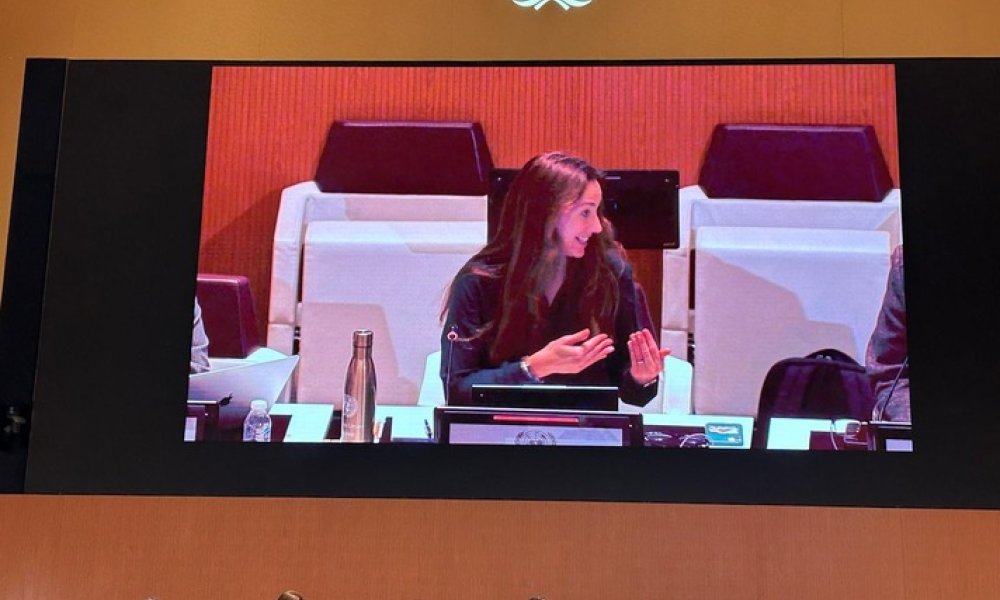With human rights rising on the investment and business agenda, we recently had the privilege of engaging with diverse stakeholders on these issues at the UN Forum on Business and Human Rights. Storebrand’s Head of Human Rights and Senior Sustainability Analyst, Tulia Machado-Helland, was a featured participant in panels where she shared insights on Storebrand’s approach and discussed how progress could be made on business responsibility with regards to human rights.
Premier forum on business and human rights
Grounded in the UN Guiding Principles on Business and Human Rights, the forum serves as a multi-stakeholder platform for discussing crucial trends and obstacles in the implementation and advancement of these principles. The forum is considered to be the world’s annual largest gathering on the topic and the levels of interest and participation remained keen this year.
Hosted in Geneva in November, this 13th UN Forum on Business and Human Rights attracted thousands of participants, including government officials, business leaders, community representatives, civil society organizations, law firms, investor groups, UN bodies, national human rights institutions, trade unions, academics, and the media.
This year's forum covered a range of pertinent topics, such as state action, technology and AI, access to remedy, indigenous peoples' rights, and human rights due diligence. Each of these subjects is central to achieving a fair and transparent society, and specific commitments in these areas form part of the UN Guiding Principles, which both we and many of the companies we are invested in, have formal commitments to operate in accordance with.
Arms industry and human rights due diligence
Storebrand’s Head of Human Rights and Senior Sustainability Analyst, Tulia Machado-Helland, was invited to feature in two panel discussions. The first of the two panels addressed the arms industry and its obligations regarding human rights due diligence.
The arms industry has taken centre stage in the news over the past years, and is equally high on the investment radar. Recent data by the Stockholm International Peace Research Institute (SIPRI) noted that arms and military services revenues by the 100 largest companies in the industry rose 4.2 per cent to $632 billion in 2023.1
However, the UN Working Group on Business and Human Rights highlighted that despite existing regulatory frameworks, arms products and services are still being exported to states where they are used to commit severe human rights violations, including potential war crimes and crimes against humanity. With global tensions rising and investors seeking to mitigate portfolio exposure to high-risk arms industries, the need for recognized legal and normative frameworks to ensure human rights is more pressing than ever.
Joining Machado-Helland on the panel were rights holders, civil society members, government representatives, and experts. In this session, they together shed light on frameworks for ensuring adequate human rights due diligence, responsible arms trade, and access to remedies for victims.
Machado-Helland, who was invited to provide insights from the perspective of being responsible for human rights at a financial institution, detailed Storebrand’s proprietary process for collecting and analysing data, and explained our norms-based and product-based screening processes. She also addressed the challenging question of whether the arms industry can be categorized as “sustainable“, and invited grassroots organizations to collaborate more effectively with investors. Her contributions were met with resounding applause and positive feedback.
Securing indigenous people’s rights
Machado-Helland also was also a featured participant in another panel discussion, on indigenous peoples' land rights, alongside representatives from indigenous communities, governments, and the UN.
There is a global increase in the demand for large-scale land acquisition and resources, with businesses, including investors, pursuing economic projects related to food, fuel, minerals, renewable energy, and conservation. While indigenous people make up 6% of the world’s population and hold an estimated 20% of the world’s landmass, they have formal legal ownership of less than only 10% of this land.
Furthermore, the processes of land acquisition often lack transparency and fail to include the participation of indigenous peoples, exacerbated by inadequate accountability mechanisms like the requirement for Free, Prior, and Informed Consent (FPIC). This lack of transparency and procedural fairness leads to indigenous lands being under constant threat of unfair and forced acquisitions, harming their rights.
The session explored how land acquisition should be integrated into business human rights due diligence, before and after obtaining business licences to operate in indigenous peoples’ territories, and the measures governments must take to protect these rights.
In this panel, Machado-Helland emphasized the importance of policy commitments and due diligence processes based on the UN Guiding Principles and OECD Guidelines for Multinational Enterprises on Responsible Business Conduct. She stressed the need for companies to verify states’ own processes, ensuring that they have consulted and obtained consent from all affected communities; and guaranteeing just and fair redress as a way to avoid contributing to violations committed by the states, before accepting any concessions or permits to operate. Companies should also conduct their own due diligence identifying indigenous lands and resources as well as engage with rights holders for a proper FPIC process.
Takeaways
Our reflection on the comprehensive dialogue at the UN Forum, is that there is a welcome interest in the role that investors can play towards ensuring that human rights are respected by companies and protected by governments. However, business trends in many areas – such as in the arms industry and in land acquisition – mean that investors are likely to face significant pressure now and in the near future, to ensure that companies they are invested in, meet their responsibilities on human rights due diligence. Investors also have a big role to play in engaging governments, to ensure that adequate standards and safeguards are in place.
Sources:
- Stockholm International Peace Research Institute, Dec 2024: “World’s top arms producers see revenues rise on the back of wars and regional tensions” (link)







